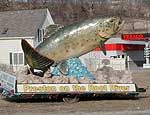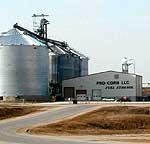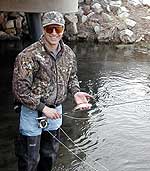By Laurel Druley
Minnesota Public Radio
May 6, 2002
Supporters of a planned expansion of an ethanol plant in Preston say it will be a boon for farmers in southeast Minnesota, who face the lowest grain prices since the Great Depression. But some environmentalists and an angling group are concerned about the potential threat the expansion might pose to the Root River, one of Minnesota's best trout streams. They say the increased demand for corn would lead to more farm chemicals getting into the river. The plant expansion will also put more pressure on Preston's waste water treatment facility.
| |||
| |
|
||
|
|||
The opening of this year's Minnesota trout season brought anglers from all over the region to the Root River. About 80 miles long, the Root is famous for trout fishing, particularly the South Branch which flows through Forestville State Park. The river has a large population of naturally-reproducing brown trout.
Jim Costello drove down with his kids from the Twin Cities to fish the Root River near Lanesboro. They come every year for the opener. Costello lifts the lid off his red cooler to show off the day's catch.
"We caught about 10 - nine rainbows and one brown trout."
Costello says the river seems well-stocked and healthy.
"I would hate to see anything happen as a result of runoff or fertilizers. It would be a shame to see trout fishing suffer from anything like that," says Costello.
While he and other anglers find plenty of fish in the Root River system, there are concerns. Some Fillmore County officials say the Root's biggest threat is from sediment and farm runoff.
| |
|
|
|
||
Bikers on the nearby Root River Trail ride by Costello and his family. In some areas, the trail provides a buffer against runoff. It separates fields of corn and other crops from the river.
Visitors to the town of Preston are greeted by a brown trout the size of a car, mounted on the bed of a trailer. The trout is the symbol of the town's link to the nearby South Branch of the Root River. While residents of Preston make some money from the tourists who come to pursue the trout, most of the community's income is linked to agriculture.
Pro Corn, a farmer-owned cooperative, operates an ethanol plant just up the road from the big trout.
Pro Corn's general manager, Richard Eichstadt, says the company hopes to double production to 40 million gallons a year. Currently, the plant processes about 20,000 bushels of corn a day. About 170 farmers sell their corn to the company.
The expansion of the ethanol plant would mean a bigger demand for corn grown in southeastern Minnesota, more income for farmers, and more jobs.
| |
|
|
|
||
Eichstadt says the demand for ethanol will grow as the nation becomes more interested in reducing dependence on oil imports.
Eichstadt says the plant does not pose a threat to the health of the Root River. He says the water discharged from the plant to the river by the ethanol process is harmless.
"This is our filter system that converts hard water to soft. We keep the soft water, use it, and then that hard water is returned back to the Root River," Eichstadt explains. "So it doesn't see our process at all. The temperature remains virtually unchanged from the time we bring it out of the ground to the time it travels to the Root River."
While the plant returns hard water directly to the river, it sends wastewater to Preston's water treatment facility. From there it is released to the river.
City officials say the ethanol plant has been economically good for Preston, and they welcome Pro Corn's expansion. But the city's water treatment plant is already at capacity. City Administrator Fred Nagle says there are no plans to upgrade the treatment facility to accommodate the increased flow from the plant. Nagle says an upgrade would cost about $300,000 - a cost that would have to be shouldered by Pro Corn.
"Pro Corn decided that maybe it wasn't worth it - that they could do more in-house to lessen the effluent. We have an agreement with Pro Corn - if we would have to upgrade they'd have to pay for it," says Nagle.
| |
|
|
|
||
Richard Eichstadt did not rule out the possibility Pro Corn would pay for the cost of the treatment plant upgrade. But the bottom line, Eichstadt says, is the expansion of the ethanol plant means Pro Corn will discharge double the amount of waste water to Preston's water treatment facility.
The Root River winds through and in and out of the karst geology of southeast Minnesota. Karst is permeable limestone with many sink holes. Geologists say water and anything in it quickly funnels into the groundwater.
That's why some anglers and environmentalists are keeping a close watch on the health of the Root, and the rural wells that provide drinking water to residents.
Gary Sobota, the southeastern Minnesota chairman of Trout Unlimited, is concerned about the broader impact of Pro Corn's expansion.
"The expansion of the ethanol plant encourages row cropping. With row cropping comes more erosion, higher water temperatures, and more chemicals applied to the ground," says Sobota. "We're most concerned about the cold water resource."
| |
|
|
|
||
Sobota says trout are sensitive to temperature changes. If the ethanol plant or water treatment facility put water into the Root without cooling it properly, fish could die.
As a conservation organization, Trout Unlimited is monitoring the Root for temperature changes. They are also sampling the river's insect life. Loss of aquatic insects could indicate a decline in the health of the river. Sobota says Trout Unlimited wants to work with farmers, not fight them.
"You're not going to take away agriculture. You're not going to take away industry. There's a lot more people going to be born on the planet, and we have to learn to work together to protect the resource - and still make it an economically viable society," says Sobota.
The expansion of the Pro Corn ethanol plant should be complete late this summer. Trout Unlimited plans to investigate Preston's water treatment facility, and its ability to handle the increased flow from the ethanol plant.
Sobota says the group plans to ask the Minnesota Pollution Control Agency to order an environmental impact statement on the expansion, and its effect on the Root River.
More from MPRMore Information





